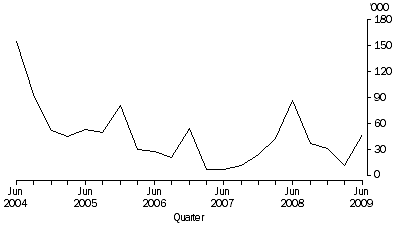JUNE KEY FIGURES
 |  | Quarter | Year ended |
 |  | March Quarter 2009 | June Quarter 2009 | June Quarter 2008 | June Quarter 2009 |
|
| Number of disputes |  |  |  |  |
 | Commenced in period (no.) | 45 | 53 | 162 | 184 |
 | Total (no.) | 48 | 58 | 166 | 192 |
| Employees involved |  |  |  |  |
 | Newly involved ('000) | 5.3 | 40.2 | 130.7 | 116.3 |
 | Total ('000) | 8.4 | 43.9 | 131.3 | 167.0 |
| Working days lost ('000) | 11.6 | 47.3 | 164.9 | 126.2 |
|
Working days lost

|  |
JUNE KEY POINTS
QUARTERLY ESTIMATES
- For the June quarter 2009, there were 58 disputes, 10 more than in the March quarter 2009.
- The number of employees involved in industrial disputes in the June quarter 2009 was 43,900, an increase from 8,400 in the March quarter 2009.
- There were 47,300 working days lost due to industrial disputation in the June quarter 2009, an increase from 11,600 in the March quarter 2009.
- The Education and training and Health care and social assistance industries accounted for 31,900 (67%) of the total number of working days lost in the June quarter 2009. The Education and training and Health care and social assistance industries also had the highest number of working days lost per thousand employees (16.9) for the quarter.
- In the June quarter 2009, Queensland accounted for 30,400 (64%) of working days lost. Queensland also had the highest number of working days lost per thousand employees (15.5) for the quarter.
YEAR ENDED ESTIMATES
- During the year ended June 2009, there were 192 disputes, 26 more than in the year ended June 2008.
- During the year ended June 2009, there were 126,200 working days lost compared with 164,900 in the year ended June 2008.
NOTES
FORTHCOMING ISSUES
| ISSUE (QUARTER) | Release Date |
| September 2009 | 3 December 2009 |
| December 2009 | 11 March 2010 |
REVISIONS
As a result of correcting errors in previously published data, revisions have been made to time series spreadsheets for Table 1 (12 months ended March 2009) and for Tables 4a, 4b and 4c (December quarter 2007).
INQUIRIES
For further information about these and related statistics, contact the National Information and Referral Service on 1300 135 070.
 Quality Declaration
Quality Declaration  Print Page
Print Page
 Print All
Print All